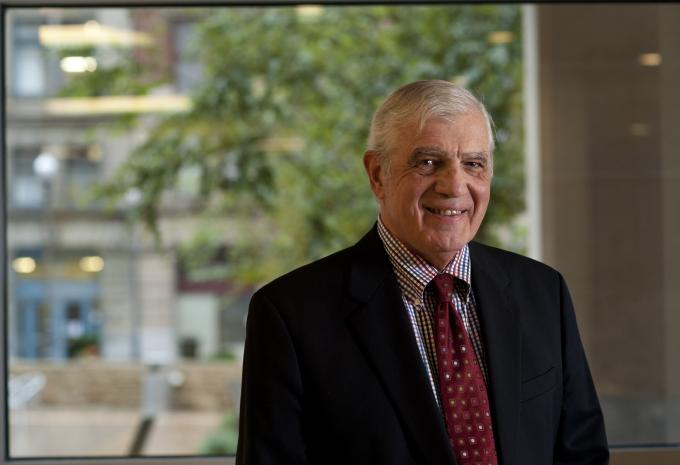Teachable Moments with John J. Kudlac, Ph.D.

The Point
Winter 2013
"I aim to inculcate in students a set of ideals, and then provide them with the skills to reach those ideals," says John Kudlac, Ph.D. "Putting it another way, we want to take each student to a place they never thought they would go."
That philosophy, he says, is consistent with "the solid tradition upon which this University was built, going back even to the days of the Business Training College and later Point Park Junior College. That is, to help those people who wanted an education to get that education," says Kudlac. "We focused on careers and professions with a solid liberal arts and sciences foundation. And that's essentially what we still do - provide a well-rounded educational foundation.
"We want graduates to go out and continue to learn, to be citizens who reason and therefore make reasoned choices."
In 1965, Kudlac was a graduate student in geology at the University of Pittsburgh when he noticed a posting for a part-time job teaching physical and historical geology at Point Park Junior College. "I interviewed, and they called back the next day to offer me full-time position to teach physics. But I'm not a physics major, I said! They replied, 'you took physical chemistry so you should be able to do it.'" With his second child on the way at the time, Kudlac says, he took the job.
In those days, it was necessary to take the freight elevator to his shared office on the seventh floor of Academic Hall. "It only stopped on the first, third, fifth and seventh floors," he recalls with a laugh.
He well remembers one particular day in the summer of 1973. "I had just chaperoned an eighth grade field trip for our parish school when my wife told me I'd received a phone call and summoned to an emergency faculty meeting on campus. "That's when they told us Point Park was bankrupt." Kudlac recalls that students collected money in tin cans on street corners and faculty who stayed were paid $90 a week. He took on additional administrative work and served as associate director of full-time admissions for two years. "We needed to let people know Point Park was still here and open for business."
Over the past four decades, Kudlac has taught everything from chemistry and basic science to earth sciences, environmental sciences, and civil engineering technology, a program that he helped to develop. He began teaching engineering geology as part of that program. "I've taught that course ever since."
Along the way, he has also held administrative positions ranging from associate dean of academic advising to executive director of enrollment management to chair of the Natural Sciences and Engineering Technology Department. During his tenure as chair, the department received its accreditation from ABET. The civil, electrical and mechanical engineering technology degree programs all received initial accreditation during the same time period, which was very rewarding, says Kudlac.
"From teaching to administrative work, I've had a lot of different opportunities for growth here," he says.
Kudlac notes that Point Park's campus growth has been impressive and that students are more involved in collegiate life than ever before, "and that's a very positive thing." But he continues to stress the importance of a strong academic foundation.
"Everyone is familiar with the saying, don't judge a book by its cover. That's my hope for Point Park - that we are not just the cover of the book. What we do - in providing that strong academic foundation -- is more important than how we look.
"That is why this University exists -- for the students. And the primary link between the students and the University is the faculty."
Text by Cheryl Valyo
Photo by Martha Rial
The Point is a magazine for alumni and friends of Point Park University

